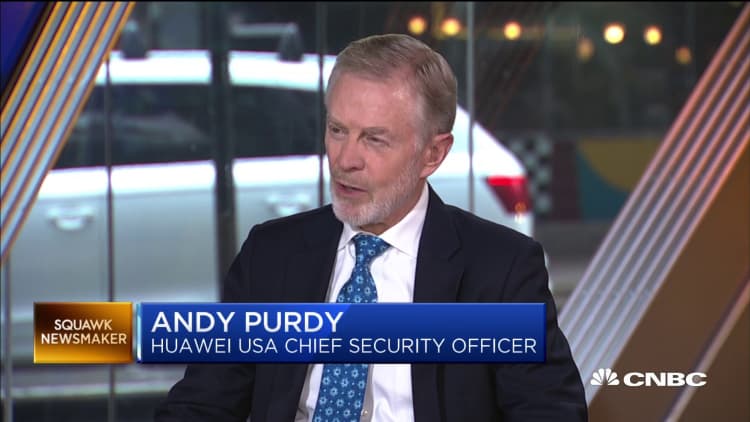The Trump administration's blacklisting of Huawei is punishing several U.S. technology companies that provide components to the Chinese networking giant. The latest to acknowledge the problem is chipmaker Skyworks Solutions.
Skyworks lowered its quarterly earnings and revenue forecast on Tuesday, telling investors that it stopped shipping products to Huawei. Shares of Skyworks dropped more than 1% at one point in extended trading and have tumbled 12% since May 15, when President Donald Trump signed an executive order declaring a national emergency because "foreign adversaries are increasingly creating and exploiting vulnerabilities in information and communications technology and services."
The U.S. Commerce Department added Huawei and dozens of its subsidiaries to the so-called Entity List, disallowing them from buying products from U.S. companies without a license.
"Skyworks ceased all shipments to Huawei and its affiliates as of the date Huawei was added to the Entity List and cannot currently predict if and when shipments will resume," the company said in a statement, adding that 12% of revenue came from Huawei.
Other companies are similarly feeling the pain. Two weeks ago, Qorvo, which makes radio frequency and Wi-Fi products for mobile devices, cut its guidance and said it's no longer distributing to Huawei and is uncertain when shipments might pick back up. Optical components manufacturer Lumentum Holdings also reduced its forecast on the Huawei news, while Neophotonics, which makes parts for quickly transferring data over networks, announced a write-down of inventories.
The companies' stock prices are down 12% to 24% since Trump's executive order.
"We are probably the largest public U.S. company with a concentrated position with Huawei," Neophotonics CEO Tim Jenks said at a Cowen conference last week. According to its annual report, Neophotonics gets 46% of revenue from Huawei.
Skyworks said that for the fiscal third quarter, which ends this month, the company reduced its revenue forecast by $60 million to a range between $755 million and $775 million. It lowered its earnings-per-share forecast by 16 cents to $1.34. Skyworks also does business with Apple, which provided 47% of total revenue in its latest fiscal year.
Following the Commerce Department's announcement last month, the agency eased some restrictions in the short term to enable continuity for telecommunications companies that have used Huawei products. China responded by saying it would prepare a list of "unreliable entities" that cut off the flow of products to Chinese businesses and "seriously damage the legitimate rights and interests of Chinese enterprises."
The spat represents the latest escalation in the trade war between the world's two largest economies after talks collapsed last month. Both countries have slapped more tariffs on billions of dollars worth of each other's goods in addition to stepping up the rhetoric.
Even without the blacklist, U.S. tech companies are concerned that higher tariffs will disrupt supply chains and lead to increased prices.
"Clearly, the implementation of incremental tariffs on the complete list of products imported from China would have industry-wide impacts," HP Inc. CEO Dion Weisler told analysts on a conference call last month.
Tech executives can only hope the current dispute is temporary given the reliance many companies have on China.
"They're a formidable company — $120 billion global supply chain," Neophotonics' Jenks said. "As a result, we expect ultimately that they continue as a customer at some level."
WATCH: Huawei could be open to 'mitigation measures' to address US security concerns, says security chief



